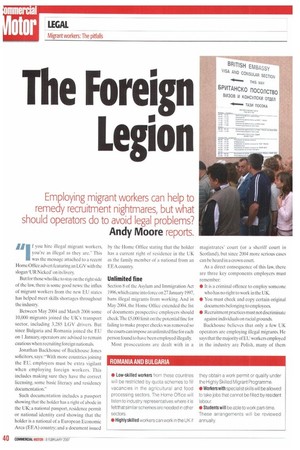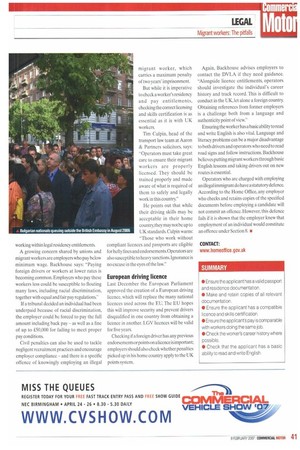The Foreign Legion
Page 40

Page 41

If you've noticed an error in this article please click here to report it so we can fix it.
LirI f you hire illegal migrant workers, you're as illegal as they are." This was the message attached to a recent Home Office advert featuring an LGV with the slogan `UR Nicked' on its livery.
But for those who like to stay on the right side of the law, there is some good news: the influx of migrant workers from the new EU states has helped meet skills shortages throughout the industry.
Between May 2004 and March 2006 some 10,000 migrants joined the UK's transport sector. including 3,285 LG V drivers. But since Bulgaria and Romania joined the EU on 1 January, operators are advised to remain cautious when recruiting foreign nationals.
Jonathan Backhouse of Backhouse Jones solicitors, says: "With more countries joining the EU, employers must be extra vigilant when employing foreign workers. This includes making sure they have the correct licensing, some basic literacy and residency documentation."
Such documentation includes a passport showing that the holder has a right of abode in the UK; a national passport, residence permit or national identity card showing that the holder is a national of a European Economic Area (EFA) country; and a document issued by the Home Office stating that the holder has a current right of residence in the UK as the family member of a national from an EEA country.
Unlimited fine
Section 8 of the Asylum and Immigration Act 1996,which came into force on 27 January 1997, bans illegal migrants from working. And in May 2004, the Home Office extended the list of documents prospective employers should cheek.The £5,000 limit on the potential fine for failing to make proper checks was removed so the courts can impose an unlimited fine for each person found to have been employed illegally.
Most prosecutions are dealt with in a magistrates' court (or a sheriff court in Scotland), but since 2004 more serious cases can be heard in a crown court.
As a direct consequence of this law, there are three key components employers must remember: • It is a criminal offence to employ someone who has no right to work in the UK.
• You must check and copy certain original documents belonging to employees.
• Recruitment practices must not discriminate against individuals on racial grounds.
Backhouse believes that only a few UK operators are employing illegal migrants. He says that the majority of EU workers employed in the industry are Polish, many of them working within legal residency entitlements.
A growing concern shared by unions and migrant workers are employers who pay below minimum wage. Backhouse says: "Paying foreign drivers or workers at lower rates is becoming common. Employers who pay these workers less could be susceptible to flouting many laws, including racial discrimination, together with equal and fair pay regulations."
If a tribunal decided an individual had been underpaid because of racial discrimination, the employer could be forced to pay the full amount including back pay — as well as a fine of up to £50,000 for failing to meet proper pay conditions.
Civil penalties can also be used to tackle negligent recruitment practices and encourage employer compliance — and there is a specific offence of knowingly employing an illegal migrant worker, which carries a maximum penalty of two years' imprisonment.
But while it is imperative to check a worker's residency and pay entitlements, checking the correct licensing and skills certification is as essential as it is with UK workers.
Tim Culpin, head of the transport law team at Aaron & Partners solicitors. says: "Operators must take great care to ensure their migrant workers are properly licensed. They should be trained properly and made aware of what is required of them to safely and legally work in this country."
He points out that while their driving skills may be acceptable in their home country, they may not be up to UK standards. Culpin warns: "Those who work without compliant licences and passports are eligible for hefty fines and endorsements. Operators are also susceptible to heavy sanctions. Ignorance is no excuse in the eyes of the law."
European driving licence
Last December the European Parliament approved the creation of a European driving licence, which will replace the many national licences used across the EU. The EU hopes this will improve security and prevent drivers disqualified in one country from obtaining a licence in another. LGV licences will be valid for five years.
Checking if a foreign driver has any previous endorsements or points on a licence is important; employers should also check whether penalties picked up in his home country apply to the UK points system. Again, Backhouse advises employers to contact the DVLA if they need guidance. "Alongside licence entitlements, operators should investigate the individual's career history and track record. This is difficult to conduct in the UK, let alone a foreign country. Obtaining references from former employers is a challenge both from a language and authenticity point of view."
Ensuring the worker has a basic ability to read and write English is also vital. Language and literacy problems can be a major disadvantage to both drivers and operators who need to read road signs and follow instructions. Backhouse believes putting migrant workers through basic English lessons and taking drivers out on new routes is essential.
Operators who are charged with employing an illegal immigrant do have a statutory defence. According to the Home Office, any employer who checks and retains copies of the specified documents before employing a candidate will not commit an offence. However, this defence fails if it is shown that the employer knew that employment of an individual would constitute an offence under Section 8. •


























































































































































































